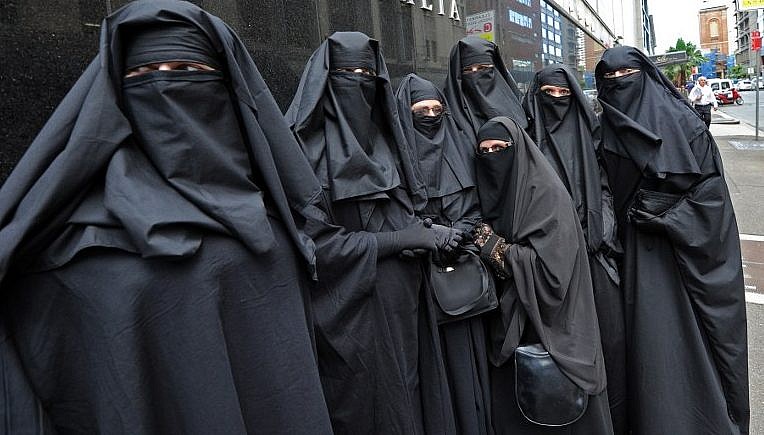In France more than half of anti-Semitism incidents, and virtually all the violent ones, are perpetrated by immigrants from Muslim countries or their descendants, according to the National Bureau of Vigilance Against Anti-Semitism.
In the Netherlands, the previous director of CIDI, the country’s foremost watchdog on anti-Semitism, said that Muslims and Arabs are responsible for about 70% of all cases recorded in any given year.
In a 2016 survey of hundreds of German Jews who had experienced anti-Semitic incidents, 41% said the perpetrator was “someone with a Muslim extremist view” and another 16% said it was someone from the far left.
Only 20% identified their aggressors as belonging to the far-right.
“There is clearly a mismatch here, and it speaks to the inaccuracy of the German official statistics,” the RIAS researcher Poensgen said.
Poensgen said his watchdog organization has talked to officials about the statistics problem.

“There was interest in our criticism, it was listened to and studied, but till now there’s severe reluctance on the federal level to change their category system,” Poensgen said.
Confidence in German authorities was undermined in 2014 when a German court ruled that anti-Semitism was not behind the attempt by three Palestinians to set fire to a synagogue in the city of Wuppertal. (A higher court affirmed the ruling in 2017.)
To some critics, there is a political dimension to the apparent reluctance of German authorities to blame anti-Semitism on Muslim immigrants. Surveys suggest that group is considerably more anti-Semitic than non-immigrants, or at least more open about it.
But “the new Muslim anti-Semitism is taboo, as addressing it would only strengthen opponents of immigration,” Krisztina Koenen, a journalist for Frankfurter Allgemeine Zeitung and der Welt, wrote in an analysis she published in March in the Hungarian-Jewish magazine Neokohn.
The government of German Chancellor Angela Merkel faced considerable criticism, including that she was importing anti-Semitism, over her decision to let in more than 2 million immigrants from Syria and the Middle East since 2015.

“The problem is that Islam is not mentioned anywhere, so Islamist or ‘pro-Palestine’ attacks, which could motivate Muslim or Arab perpetrators, can go in at least three categories: right-wing (nationalist), foreign (secular) or religious,” Veszpremy told JTA.
“The de facto situation is that pretty much any anti-Semitic incident in Germany is automatically attributed to the far right because of how the classification system works.”
In France and Belgium, authorities are frequently accused of downplaying or sugarcoating left-wing and immigrant anti-Semitism.
“Today I no longer have full confidence that anti-Semitic hate crimes in France are handled properly,” Sammy Ghozlan, a former police commissioner and founder of France’s National Bureau for Vigilance Against Anti-Semitism, or BNVCA, recently told JTA.
He cited a series of perceived failures in the murder trial of a Muslim man who killed his Jewish neighbor while shouting about Allah and calling her a demon.
The judge presiding over the case recently reopened the issue of the defendant’s sanity — on her own initiative — after he was found fit to stand trial in psychiatric evaluations following his arrest. Critics charge that the court appeared reluctant to say the attack was motivated by anti-Jewish animus.
In its annual report for 2016, the French National Consultative Commission on Human Rights, a government watchdog, wrote that a “significant part of the anti-Semitic acts (actions and threats) pertains to neo-Nazi ideology, whereas in most other cases the perpetrators’ motivations are difficult to ascertain.”

It did not mention attacks by Muslims, who BNVCA says are responsible for nearly all violent anti-Semitic incidents in France.
The report also questions the very existence of a “new anti-Semitism” generated by critics of Israel, saying that if this new anti-Semitism exists, “then it pertains to a minority” of the cases.
In Belgium, the lawyer for the country’s federal watchdog against racism, UNIA, in 2017 protested the hate speech conviction of a Palestinian man who shouted about killing Jews at an anti-Israel demonstration even though UNIA was among the initiators of his trial. The conviction was “distorted justice instead of true justice,” the UNIA lawyer wrote.
Joel Rubinfeld, president of the Belgian League Against Anti-Semitism, said the case showed that UNIA was “part of the problem, not the solution, of anti-Semitism.” The Flemish Forum of Jewish Organizations said in 2017 that it has “lost all confidence” in UNIA.
Belgian prosecutors recently dismissed a criminal complaint filed against a Turkish cafe owner who in 2014 placed a sign on his business saying dogs are welcome at his business near Liege, “but Jews are not.”
Follow @Cureurope on Twitter to help us save Europe



